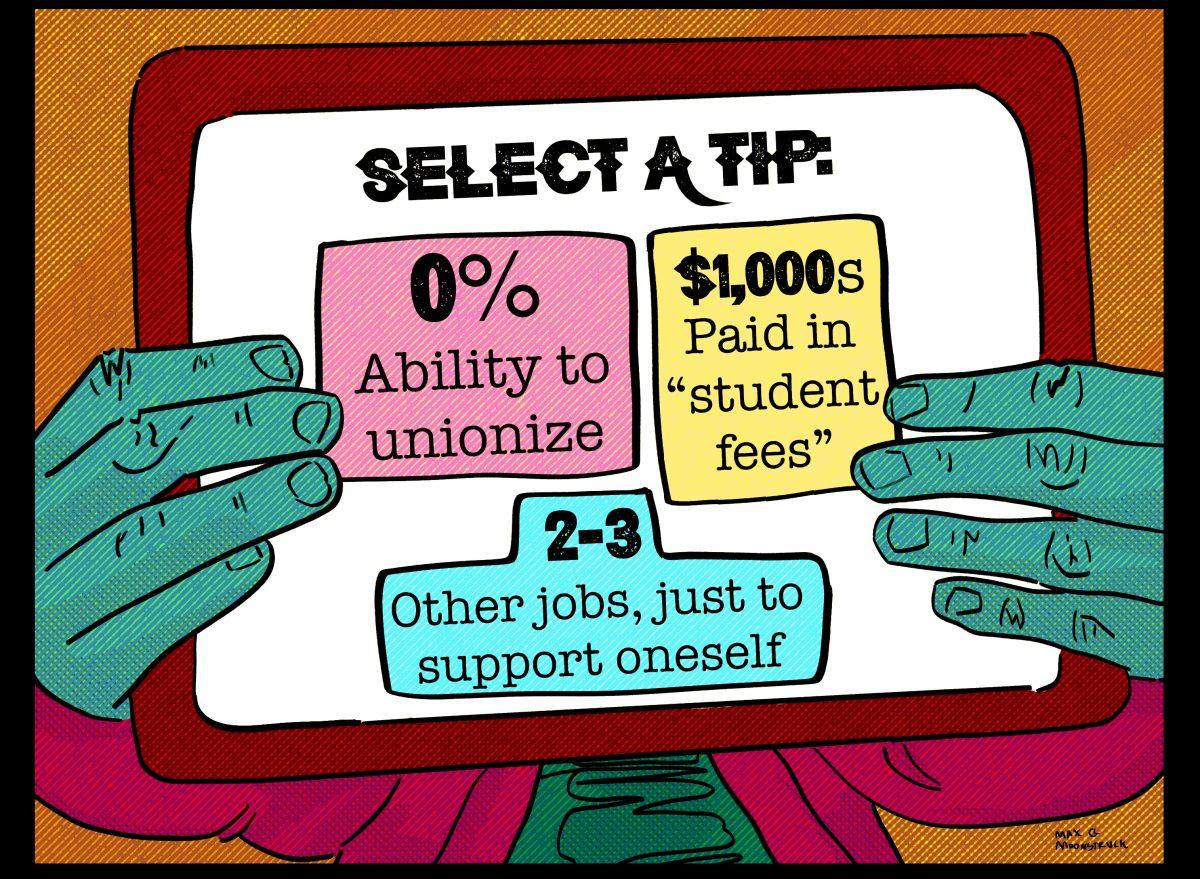Technician asked graduate student workers what they wished administration, faculty and undergraduate students understood about graduate student workers. Here’s their response.
Editor’s note: These responses have been lightly edited for clarity, style and space.
Nay Achkar, history
As a graduate student worker, the main issue is the stipend. With the food costs rising and the rent increasing every other year, the stipend is impossible to live on for basic needs. Money is a worry when we look at the time we put into finishing school, TAing and sometimes having another part-time job to pay for fees, basic life costs and medical bills that are not always covered by insurance.
After rent, electricity, water, internet, apartment insurance and food, there is nothing left. Living paycheck to paycheck might be expected in grad school, but $1,500 ($1,224 after tax) does not reflect the life of an adult in Raleigh, especially when we work hard to keep the University’s standards high in our field.
As a 26-year-old graduate student worker, I need to turn to family when waiting for my next paycheck to get groceries. While I am lucky that I can find support, I am an exception. And having to ask for support worries me about the future. By the time I am done with MA/Ph.D., I will be a broke, 30-year-old Ph.D., while having worked hard for years.
Lindy Olive, sociology
First, being a grad student isn’t just about studying. We wear every hat possible to keep the University running. We are teachers, mentors, researchers, administrators, project managers and activists — and that’s just on campus.
Second, with NC State grad student wages, it is close to impossible to meet the demands required to succeed. Like, how can we have the capacity to generate new knowledge (which we do), be active in our coursework and also do all the things required to get assistance including going to the food pantry, signing up for food stamps, re-budgeting again and again, cooking, taking the bus and putting in hours at a second job?
The thing is, I’ve done grad school before on less money than I make at NC State, but the cost of rent was a third of my income and I only paid $350 for student fees each semester. Living in Raleigh, rent is almost half of my income, and I pay $1,200 in student fees each semester. There is almost nothing left to do anything close to living a life.
It’s very clear the University does not value our humanity or the knowledge and skills we use to help rake in the grant money and keep the University ranked one the best in the country. If “Think and Do” is our motto, we need everyone thinking about how much the University exploits graduate student workers and do something about it.
Kaitlyn Tiffany, parks, recreation and tourism management
A fundamental misunderstanding around graduate student workers is the idea that because we’re here and we’re making it work, we’re doing just fine with the resources we’re being provided. Part of my research looks at diversity, equity and inclusion, and I’ve come to realize that the lack of diversity among graduate students in my area of study is due in large part to the inability of anyone other than those already privileged to pursue higher education.
The ONLY reason I’m able to survive on the TA stipend NC State provides me is because I live with family. They cover my housing and help me with a large part of my other expenses. Even without paying rent (and commuting 40+ minutes to campus daily), I live paycheck to paycheck.
I don’t know a single graduate student that lives off their stipend alone — everyone is married with another source of income, lives off credit card debt, has family support or has saved up for years before coming to grad school to afford to even eat. We do not make enough money to survive in Raleigh, and we are not doing fine.
Savanna Smith, civil, construction and environmental engineering
I wish administration and faculty realized the financial stress graduate student workers are under. For example, we frequently have to front the money to attend professional conferences and then get reimbursed after the event. But these usually cost at least $1,500 (which is 75% of our month’s salary), so being asked to pay that three months before a conference and then not getting reimbursed until a month after the conference is a huge ask.
Alana Gomez, public history
As a graduate student worker, I have had to work multiple jobs to make ends meet. On top of a busy class and homework schedule and trying to navigate grad school, this was a lot in my first semester. When I started as a teaching assistant in the fall of 2022, we were paid $512 every two weeks. This is not a living wage, nor is it enough to meet the rent price of the majority of places in Raleigh.
Further, I have learned that the pay across graduate students varies widely. This is not only unfair but also detrimental to the value placed on certain areas of study. Grad students deserve fair pay and living wages. End of story.
Sanjay Kalliat, chemistry
The overwhelming reason for poor mental health among graduate workers has to do with how little we are paid. We simply cannot keep up with the cost of living, and no amount of Wellness Days and anodyne mental health awareness drives will address this particular issue.
While I think mandatory days off and an increased number of fitness classes for mental health is appreciated, it does nothing to improve our material conditions. This is by far the biggest thing that the administration needs to understand, or perhaps they do, and they can’t/refuse to address it.
As someone who has been a TA for 10 semesters, my message to undergrads is to attend as many office hours as they can. Professors and TAs may not be able to fully pay attention to an individual student depending on the size of the class, so you can get much more tailored advice and help during office hours.
Louis Goodall, geospatial analytics
I wish more people knew about the disparity between programs and how much some graduate students have to “live” on. Fortunately for me, my department is nice and our stipend is sizeable (still below the Raleigh living wage), but some grad students have a stipend of $10,000 or less, and we all have to pay student fees (~$2400 per annum) to NC State, which effectively means we are paying to be employed.
Furthermore, while I am not sure of the percentage, NC State takes a cut off the top of our grants that fund us before the grant is even sent to our advisors to then be given to us. It is true that most/all universities do this, but it’s kind of a slap in our face to do that and then ask us to pay money to be employed.
I don’t know who is actually fighting for us on a University-wide level. Even the GSA president recently abstained from voting on an initiative that was implemented to charge MEA Masters students an extra $3,000 (approx) each year rather than vote no on it. NCSU relies on a constant revolving door of students so that nothing will change.
Anonymous graduate student worker in CHASS
I did my undergraduate at NC State and am now a graduate student, and I saw how the University changed during and after COVID. I now understand why some of my graduate TAs put no effort into teaching. We are expected to primary instruct AND complete our graduate degree in a timely manner, and most of us in my department have a second and/or third job just to keep afloat in Raleigh prices.
We pay more fees than the undergraduates (our fees are literally just all the undergraduate fees plus a graduate fee for the privilege of doing labor for the University), and we even have to pay to park to be able to teach. I had to take out student loans just to pay the student fees and parking.
They only pay us for nine-month contracts (late August to early May), but we are expected to have the course ready to teach on day one of the fall semester, so we are doing tens or even hundreds of hours of unpaid labor to course prep during the summer, especially if it’s a course we haven’t taught before.
We’re understaffed and underpaid and overworked; it’s no wonder we’re having a hard time recruiting graduate students if we aren’t competitive in our offers like other schools.
Egemen Aras, nuclear engineering
Being a graduate student at NC State University is indeed a privilege. The institution offers a highly diverse and research-intensive environment, aligning with its inspiring motto, “Think and Do.” However, as an international graduate student living with my family, I’ve identified areas where improvements can be made to enhance the overall graduate student experience.
One of the notable challenges faced by graduate students with families is financial stability. It has become increasingly difficult to sustain a decent standard of living on the stipend provided, especially when supporting a family. The cost of living, including housing expenses, has risen steadily, yet there has not been a corresponding increase in stipends or salaries. Furthermore, graduate students are ineligible for employee benefits, such as child care support, even though child care expenses can be comparable to rent.
Additionally, the University’s requirement for graduate students to pay an entire semester’s rent upfront, despite receiving stipends biweekly, poses a significant financial burden that can be nearly impossible to manage.
I respectfully propose that the University consider implementing measures to provide economic support to graduate students. This would allow students to dedicate more of their time and focus to their research, ultimately resulting in more groundbreaking discoveries and contributions in various fields of study. By addressing these financial concerns, we can unlock the potential for further innovation and excellence in research.











